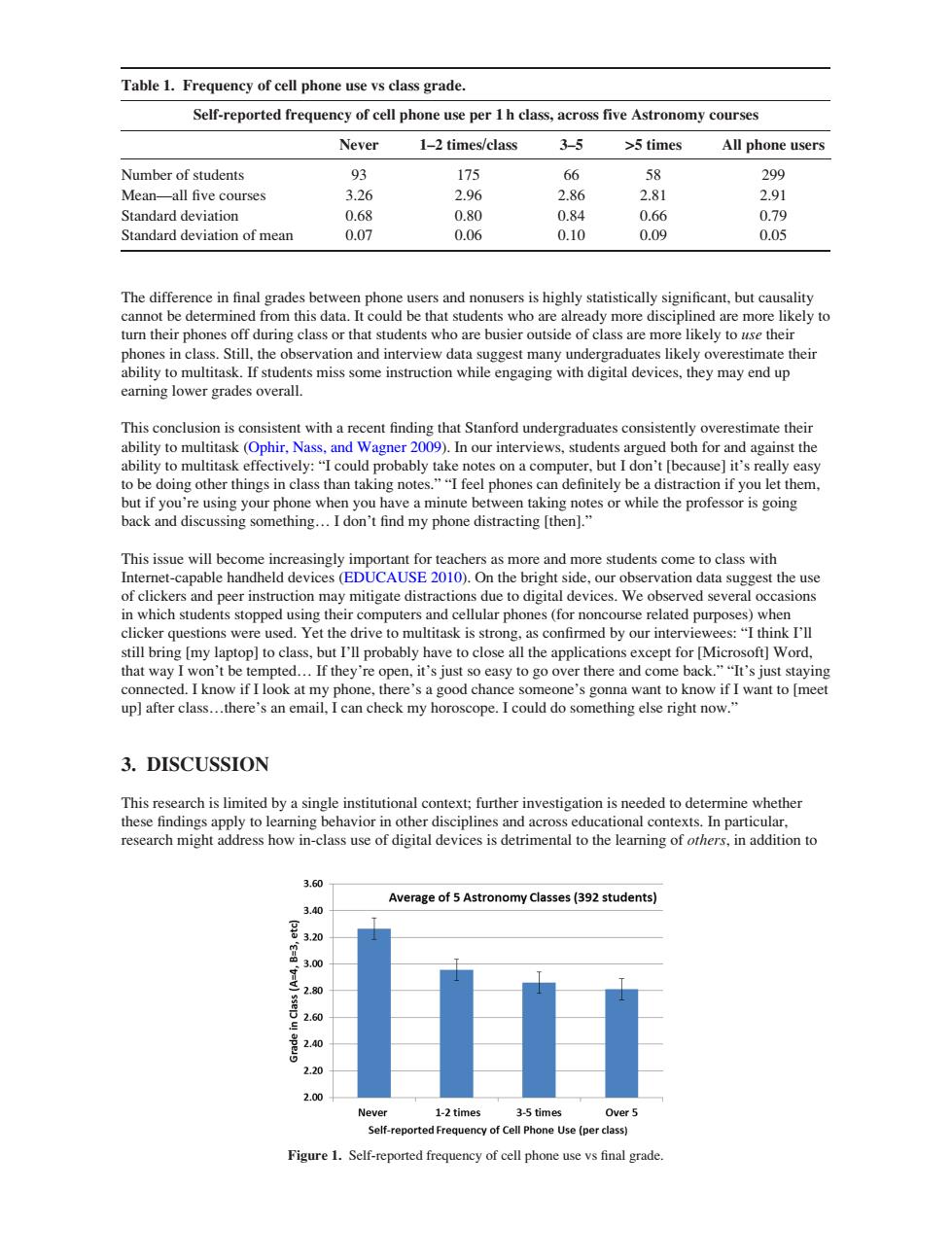正在加载图片...

Table 1.Frequency of cell phone use vs class grade. Self-reported frequency of cell phone use per 1 h class,across five Astronomy courses Never 1-2 times/class 3-5 >5 times All phone users Number of students 93 175 66 58 299 Mean-all five courses 3.26 2.96 2.86 2.81 2.91 Standard deviation 0.68 0.80 0.84 0.66 0.79 Standard deviation of mean 0.07 0.06 0.10 0.09 0.05 The difference in final grades between phone users and nonusers is highly statistically significant,but causality cannot be determined from this data.It could be that students who are already more disciplined are more likely to turn their phones off during class or that students who are busier outside of class are more likely to use their phones in class.Still,the observation and interview data suggest many undergraduates likely overestimate their ability to multitask.If students miss some instruction while engaging with digital devices,they may end up earning lower grades overall. This conclusion is consistent with a recent finding that Stanford undergraduates consistently overestimate their ability to multitask(Ophir,Nass,and Wagner 2009).In our interviews,students argued both for and against the ability to multitask effectively:"I could probably take notes on a computer,but I don't [because]it's really easy to be doing other things in class than taking notes.""I feel phones can definitely be a distraction if you let them, but if you're using your phone when you have a minute between taking notes or while the professor is going back and discussing something...I don't find my phone distracting [then]." This issue will become increasingly important for teachers as more and more students come to class with Internet-capable handheld devices (EDUCAUSE 2010).On the bright side,our observation data suggest the use of clickers and peer instruction may mitigate distractions due to digital devices.We observed several occasions in which students stopped using their computers and cellular phones(for noncourse related purposes)when clicker questions were used.Yet the drive to multitask is strong,as confirmed by our interviewees:"I think I'll still bring [my laptop]to class,but I'll probably have to close all the applications except for [Microsoft]Word, that way I won't be tempted...If they're open,it's just so easy to go over there and come back.""It's just staying connected.I know if I look at my phone,there's a good chance someone's gonna want to know if I want to [meet up]after class...there's an email,I can check my horoscope.I could do something else right now." 3.DISCUSSION This research is limited by a single institutional context;further investigation is needed to determine whether these findings apply to learning behavior in other disciplines and across educational contexts.In particular. research might address how in-class use of digital devices is detrimental to the learning of others,in addition to 3.60 Average of 5 Astronomy Classes(392 students) 3.40 3.20 3.00 2.80 20 2.20 2.00 Never 1-2 times 3-5 times Over 5 Self-reported Frequency of Cell Phone Use(per class) Figure 1.Self-reported frequency of cell phone use vs final grade.The difference in final grades between phone users and nonusers is highly statistically significant, but causality cannot be determined from this data. It could be that students who are already more disciplined are more likely to turn their phones off during class or that students who are busier outside of class are more likely to use their phones in class. Still, the observation and interview data suggest many undergraduates likely overestimate their ability to multitask. If students miss some instruction while engaging with digital devices, they may end up earning lower grades overall. This conclusion is consistent with a recent finding that Stanford undergraduates consistently overestimate their ability to multitask (Ophir, Nass, and Wagner 2009). In our interviews, students argued both for and against the ability to multitask effectively: “I could probably take notes on a computer, but I don’t [because] it’s really easy to be doing other things in class than taking notes.” “I feel phones can definitely be a distraction if you let them, but if you’re using your phone when you have a minute between taking notes or while the professor is going back and discussing something… I don’t find my phone distracting [then].” This issue will become increasingly important for teachers as more and more students come to class with Internet-capable handheld devices (EDUCAUSE 2010). On the bright side, our observation data suggest the use of clickers and peer instruction may mitigate distractions due to digital devices. We observed several occasions in which students stopped using their computers and cellular phones (for noncourse related purposes) when clicker questions were used. Yet the drive to multitask is strong, as confirmed by our interviewees: “I think I’ll still bring [my laptop] to class, but I’ll probably have to close all the applications except for [Microsoft] Word, that way I won’t be tempted… If they’re open, it’s just so easy to go over there and come back.” “It’s just staying connected. I know if I look at my phone, there’s a good chance someone’s gonna want to know if I want to [meet up] after class…there’s an email, I can check my horoscope. I could do something else right now.” 3. DISCUSSION This research is limited by a single institutional context; further investigation is needed to determine whether these findings apply to learning behavior in other disciplines and across educational contexts. In particular, research might address how in-class use of digital devices is detrimental to the learning of others, in addition to Table 1. Frequency of cell phone use vs class grade. Self-reported frequency of cell phone use per 1 h class, across five Astronomy courses Never 1–2 times/class 3–5 >5 times All phone users Number of students 93 175 66 58 299 Mean—all five courses 3.26 2.96 2.86 2.81 2.91 Standard deviation 0.68 0.80 0.84 0.66 0.79 Standard deviation of mean 0.07 0.06 0.10 0.09 0.05 Figure 1. Self-reported frequency of cell phone use vs final grade